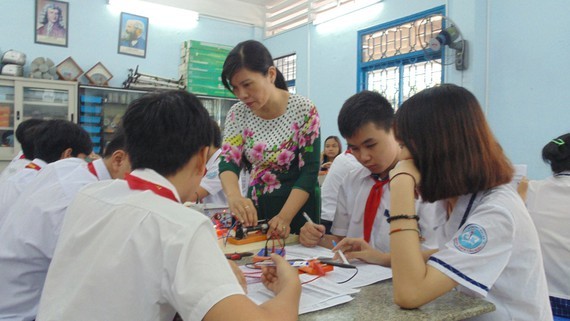
Recently, the Institute of Education Management in Ho Chi Minh City in coordination with the Vietnam Youth Academy organized a scientific seminar themed “ Vocational guidance program and startup for high-school students in the current context”. Head of the Education Psychology Faculty Vu Dinh Bay said although the Prime Minister has approved the program in the period of 2018 -2025, several disadvantages still exist in the career-oriented education in reality.
The number of students who have wrong choices of their future job has increased because they don’t really understand their own abilities and hobbies. The paradox is that the number of unemployed workers with bachelor’s degree is higher than the number of unemployed workers who have graduated from junior college and intermediate school because people with bachelor’s degree are abundant while the country is short of trained workers.
According to Nguyen Dang An Long from the Department of HCMC Education and Training, the management of the education and the training has still been overlapping and the linkage between schools and businesses has not been as tight as expected while teachers in vocational training facilities are inexperienced.
Moreover, stereotypes of vocational education are not true; therefore, most of parents want their children to have university degree.
Presently, students in junior high schools in Ho Chi Minh city particularly and in the country generally have four choices as per career guidance. Students can pursue learning in public and non-public senior high schools; or they can enroll in vocational training schools; or they both learn literature and learn attend vocational course; or they work as a worker ( those from low-income families) and they go abroad for studying ( those from rich families).
The reality has shown that quota for public senior high schools increase yearly but it has not met with requirements. Teacher Nguyen Quoc Cuong of Hong Ha High School in Go Vap District said career guidance is provided by main teachers or other teachers who have not trained before.
Last but not least, schools lack relevant reference materials, counselling rooms, and recording keeping, so they cannot create career consultation files for their students. Even, colleges do not have experts in this field and the consulting teams are not well-trained; hence, they can’t assist high schools in career guidance. Furthermore, the career guidance program mainly focuses on senior high schoolers rather than junior high schoolers.
According to teacher Hang Quoc Tuan of Phong Phu High School in the Mekong Delta Province of Tra Vinh’s Cau Ke District said that classifying students is not only a matter of the education sector but also of the entire machinery of state, enterprises and parents. To improve vocational training activities, the role of the party levels, the machinery of state, local administrations, social - political organizations and media in raising parents and students’ awareness of vocational education.
Apart from that, the education sector needs to have detailed regulations of classifying students and connecting high schools, vocational education facilities and higher education institutions as well as setting up vocational high schools and technique vocational schools massively to attract ninth graders who want to learn a job after graduation.
Additionally, lecture Tran Thanh Xuyen from the Community College in the Mekong Delta Province of Hau Giang said that communist activities of communist youth unions in schools must link with school management board and enterprises to promote vocational training and startup activities amongst students relentlessly.
At the same time, local government should spend buying teaching and learning equipment for vocational training schools meanwhile enterprises should give support these specialized schools by providing financial aids and practical guidance.
























